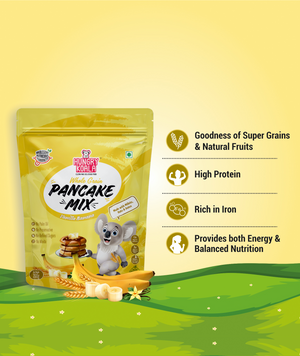Importance of First Feeds
Nov 01 , 2022
The first thousand days of a child are extremely crucial as his or her brain is rapidly developing and Is almost 90% complete by the end of 3rd year.
A lot of factors like environmental , emotional etc play a viral role during this period and the most important is nutrition.
According to WHO a new born is supposed to be exclusively breastfed within first hour of birth until 4 to six months of life .Nevertheless there are a thousands of mothers who cannot secrete breast milk for multiple known and unknown reasons, but that doesn’t necessarily mean that their infant is completely deprived of all those essential and growth promoting nutrients . Mother’s love and affection to her child is unconditional and she has a lot of alternative substitutes available today to provide her child the most appropriate nourishment unlike the older times.
Complementary weaning foods are initiated after six months of life because breast milk alone is not sufficient to support the babies growth beyond six months.
Here is the challenge faced by a lot of parents as to what to feed , how to feed, how often to feed , what quantity to feed so on and so forth. My recommendation is very simple, you must always start with feeds which are easily available, easily digestible , allergen free and palatable, the last point being subjective.
Infants require about 80-100kcal/kg/day for their optimal growth and development hence the foods ,in addition to breast milk, must be provided making sure this nutritional target is achieved.
To begin with you can introduce purées made either with fruits like bananas, steamed apples ,pear etc or ones made with vegetables like sweet potatoes, carrots , broccoli, tapioca etc. Salt and sugar are generally not recommended till about 10-12 months of age however in a few exceptional cases where compliance is a challenge ,a pinch can be added occasionally.
It’s not very surprising to see “neophobia “ in babies which is spitting or refusing newly introduced feeds hence multiple attempts with a slight modification of the texture or consistency might help you succeed. To assess the digestion and acceptance it’s advisable to follow what’s called as “ three day wait” rule. That means whatever feeds you introduce make sure you give same feeds consecutively for three days before changing to new food in order to make sure child doesn’t show any allergies for that particular food and his digestive system gets used to these feeds well.
Adequacy of feeds are generally indicated by satiety signs like good urine output (6-10 times) in a day, sound sleep, and lesser episodes of crankiness.
While introducing solid foods make sure it’s energy dense, well grounded and cooked , not too diluted which might make the baby full and compromise on the nutritional value, not too thick which might interfere with the swallowing process itself.
One frequently asked question is how much water to be given to babies ?, well though there’s no specific guidelines but it’s recommended that during summers if it’s too hot you can give 4-6 spoons water after every solid meal or about 100-150 ml a day and during pleasant weathers up to 100ml per day would suffice. Water intake should gradually be increased as the baby grows to make sure hydration and digestion both are in check.
If you are planning to introduce non veg food ideally 8 months is the best time when you can start hard boiled egg yolk first , watch for three days then go ahead with albumin as well. Steamed chicken and mutton pieces along with soups are protein rich . Fish is the best source of protein for a growing brain and can be started by 9 months and recommended to be given at least twice a week as it has omega 3 , DHA s and other essential amino acids for better neurological functions.

